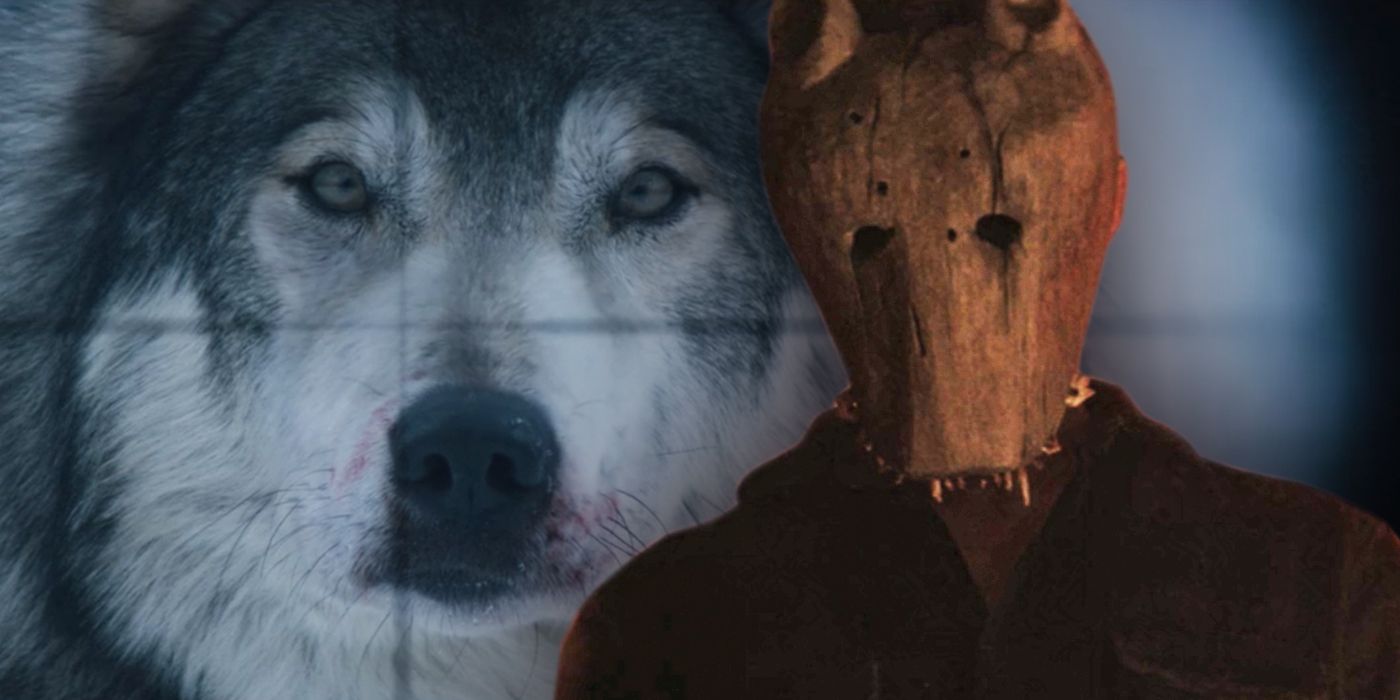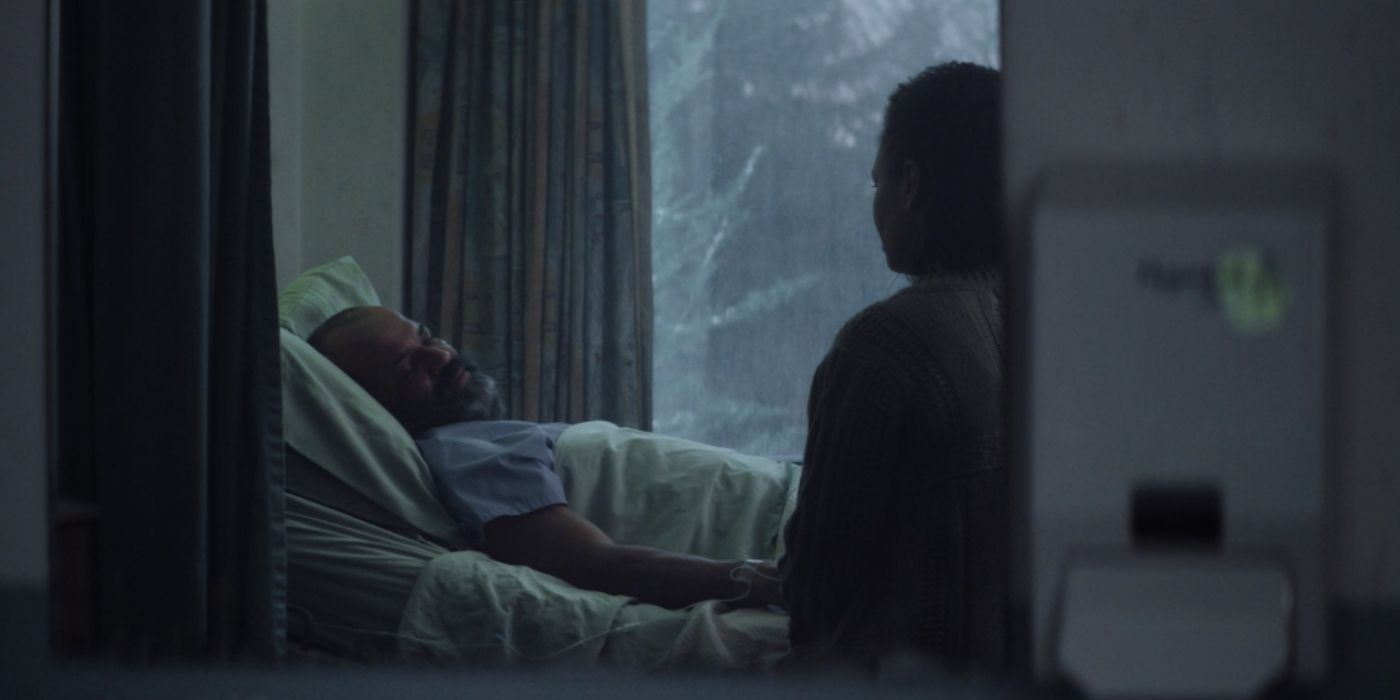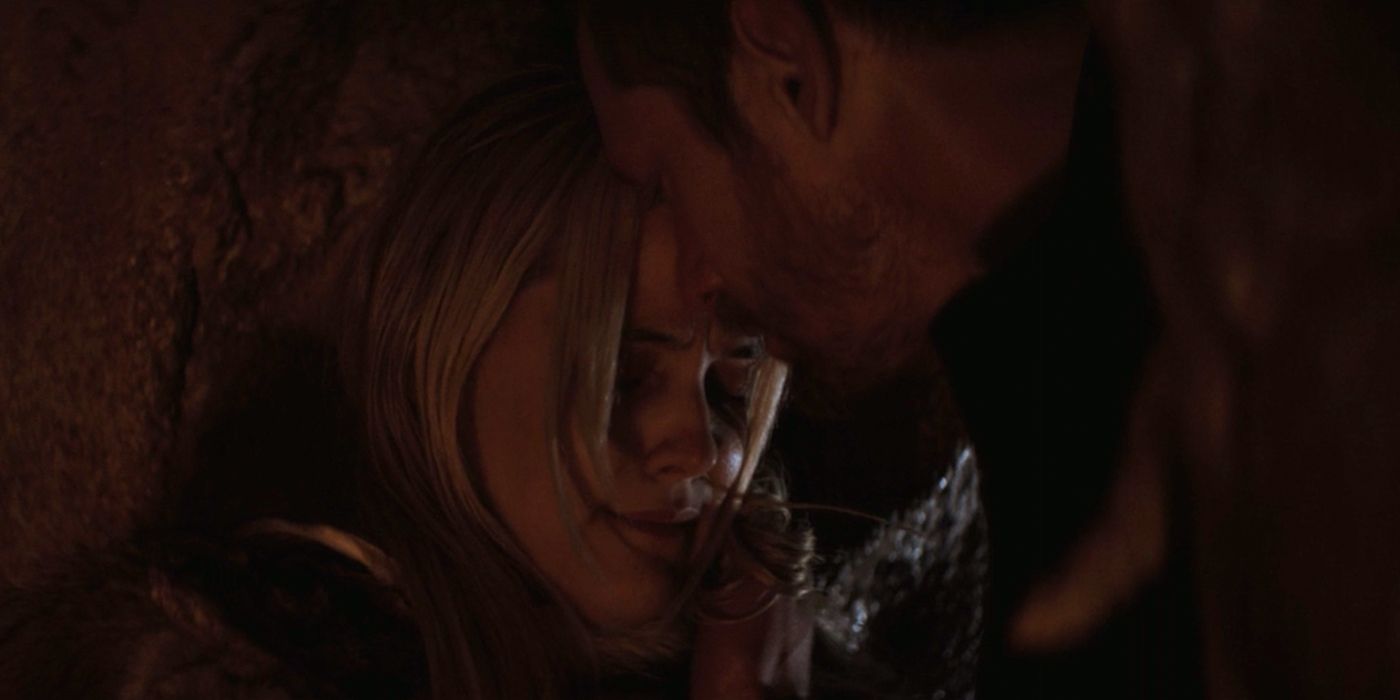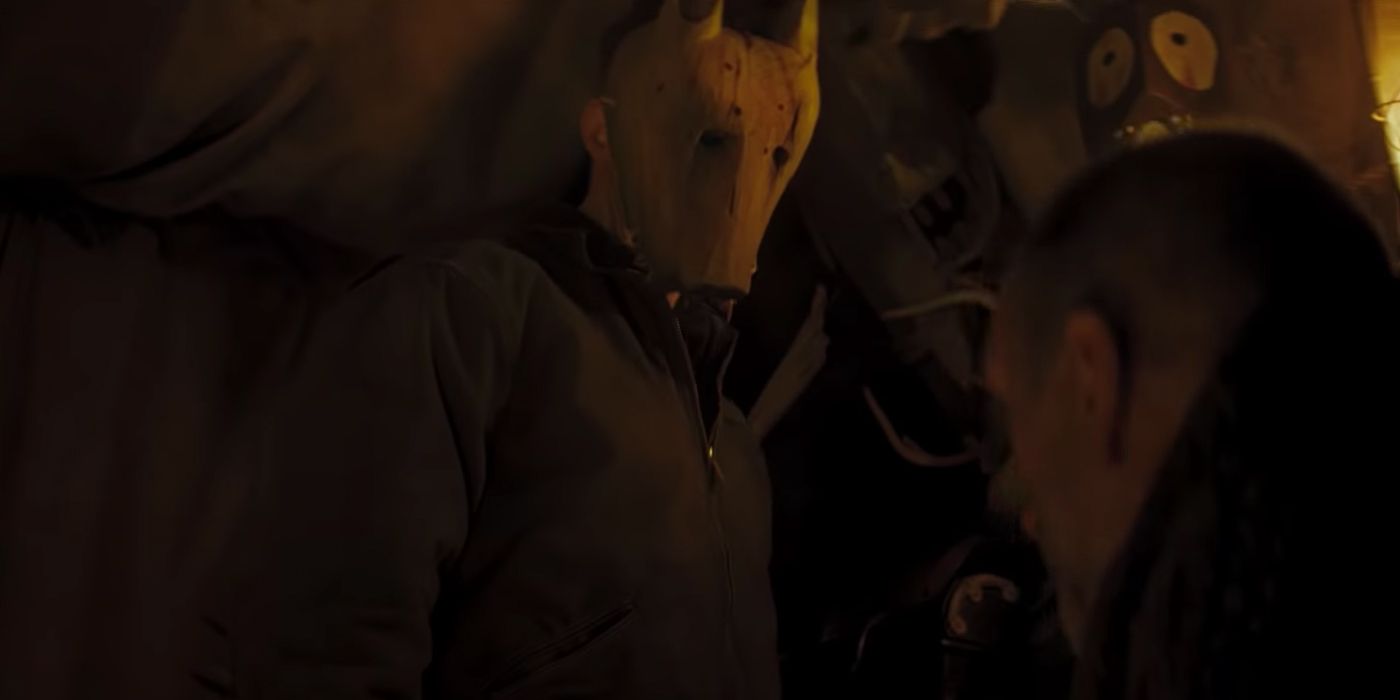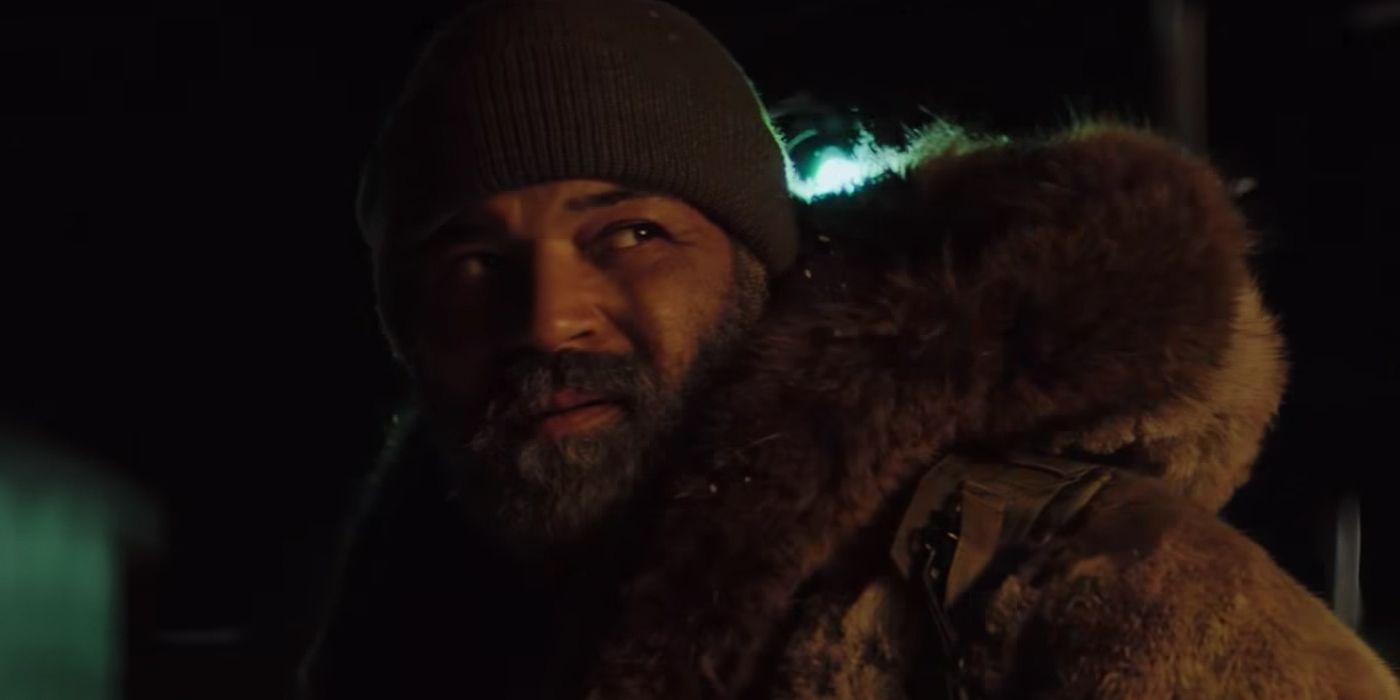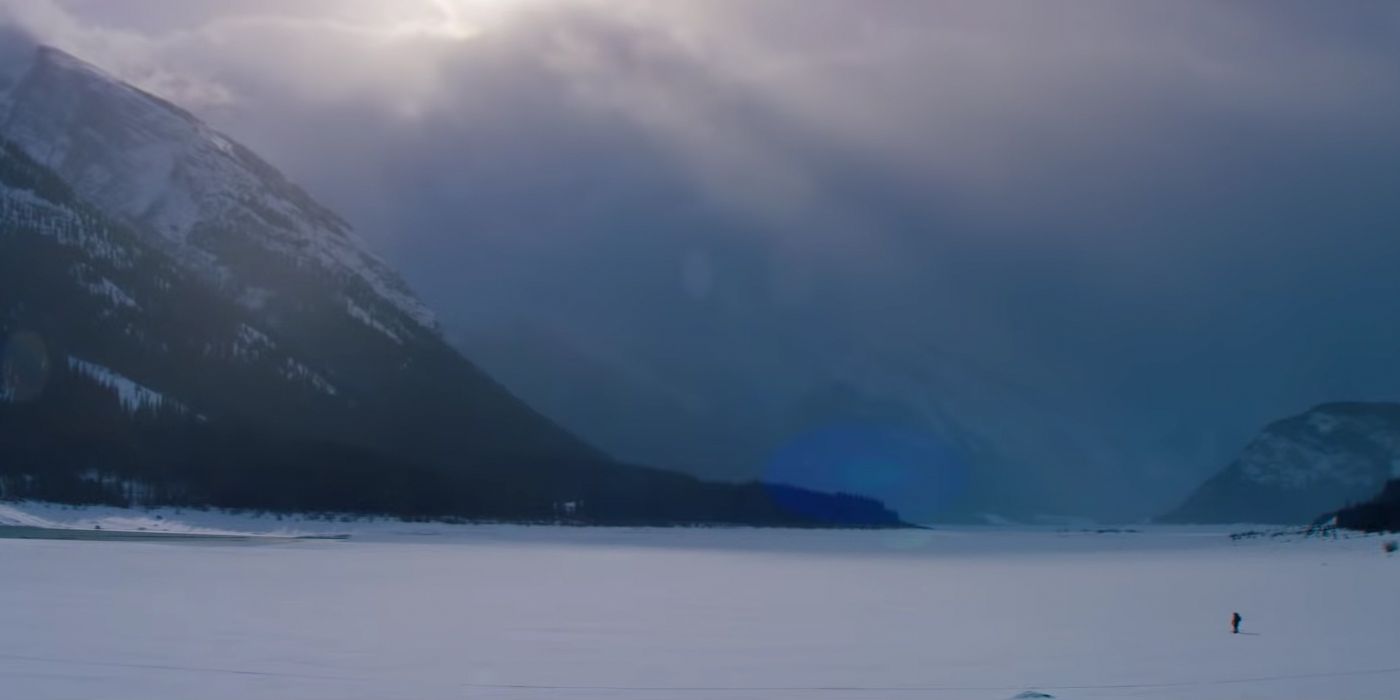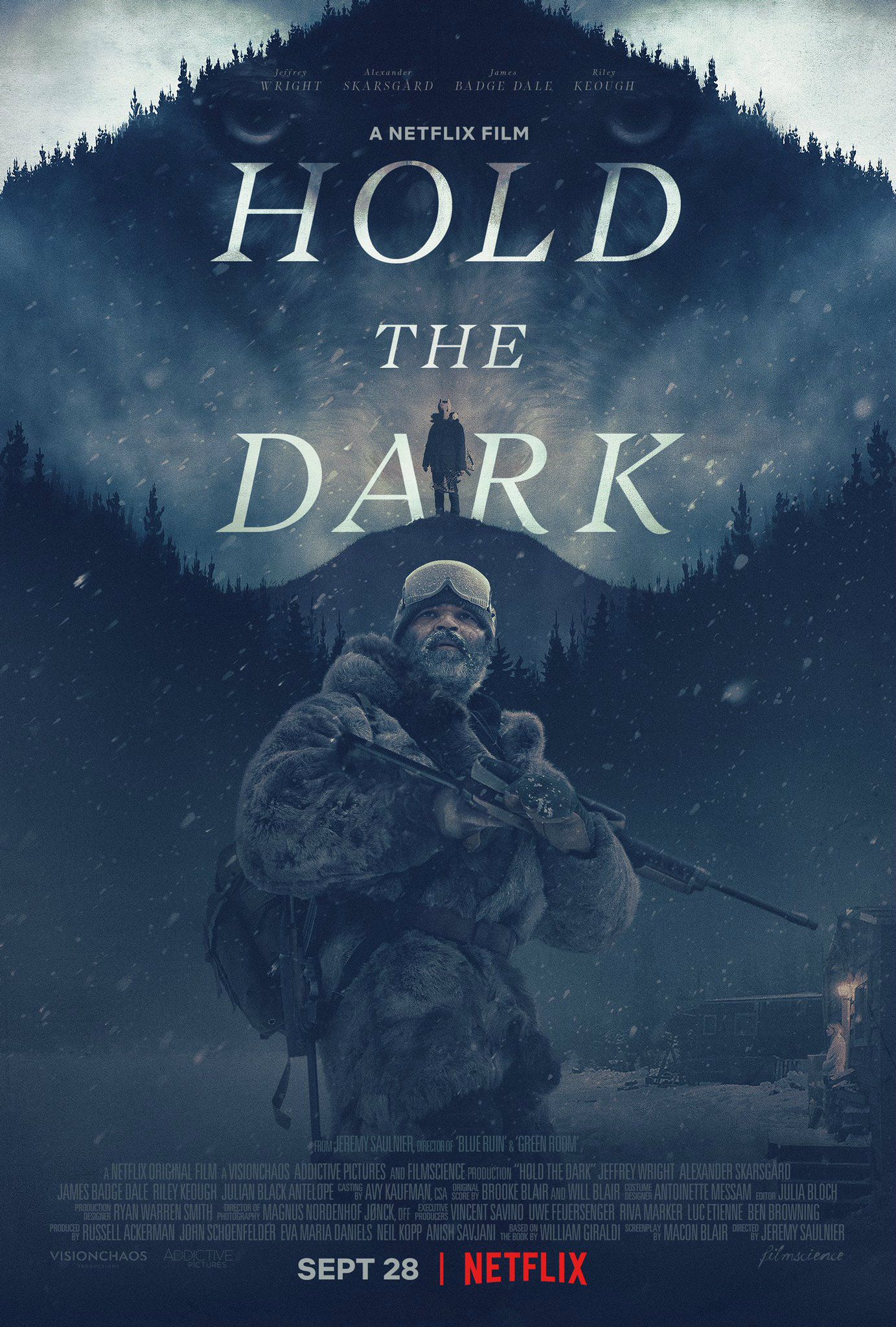WARNING: Major spoilers for Hold The Dark.
Netflix's Hold The Dark is a pitch black movie with an ambiguous ending - from the wolves to the humans in wolf's clothing. Director Jeremy Saulnier has made a name for himself with ultra-violent, existential thrillers Blue Ruin and Green Room, and his latest twists that into something even more primal about the human condition.
Hold The Dark begins with wolf expert Russell Core (Jeffery Wright) being called up to the Alaskan wilderness by Medora Sloane (Riley Keough) to hunt down the creatures that killed her young son. However, he quickly learns that the mentally unstable mother murdered her own child, sending the county into chaos as she goes on the run. Her husband, Vernon Sloane (Alexander Skarsgård), returns from fighting in Iraq and, after stealing his son's body from the morgue, starts to hunt Medora down. Tempers in the town fray, leading to a police massacre at the hands Vern's friend Cheeon (Julian Black Antelope) and Russell teaming up with police chief Donald Marium (James Badge Dale) to find Medora before her husband.
Related: Watch The Hold The Dark Trailer
All of that is simmering establishment for Hold The Dark's climactic act, which sees the story and thematic threads come together in a violent, animalistic, cooling finale. Here's what it - and the whole movie - really means.
- This Page: Incest & The "Dark" In Hold The Dark Explained
- Page 2: What Hold The Dark's Ending Means
What Happens In Hold The Dark's Ending
Thinking back to his first meeting with Medora, Russell deduces that she's hiding in a hot spring a few hours from the town which she described as "close as I can get to warmth." He and Donald fly up in a forming storm, but Vern's already beaten them there: he kills the chief and stalks Russell as he escapes towards the spring. Medora is indeed hiding there, although isn't shaken by her husband's approach. Vern shoots Russell with an arrow then goes to choke his wife. She removes his mask, he pauses, and they passionately kiss before collapsing together to the floor.
Afterward, Vern pulls the arrow from Russell and leaves him to escape. Core makes it partway from the cave only to be surrounded by wolves. However, they don't attack and Russell is saved by a group of native women while Vern and Medora retrieve their son's body and, carrying his coffin behind them, walk off into the wilderness. The movie ends with Russell in hospital, reunited with his estranged daughter (whom he said was a key motivation for him coming to Alaska). They share a moment and he prepares to recount the whole sorry tale.
That's what happens, but the motivations behind many of the characters in the final act - and the meaning of much of what came before - is left hanging intentionally by Saulnier.
Medora and Vernon Were Brother & Sister
The most important piece of information within that ambiguity is that, yes, Medora and Vernon Sloane were twin brother and sister. This is hinted at throughout the story - Medora says she never "met" Vern but always knew him, the Indian Hunter at the mine says the pair have the same hair and eyes, and a photo shows the two as children in a decidedly family setup - and, although never explicitly confirmed, the implication of their relationship. born from inevitability. is unavoidable. This is more overtly stated in William Giraldi novel on which the film is based, where it's more of a conventional twist that serves to explain much of what's been going on (Medora is pregnant with another child of incest).
In the movie, this unspoken incestuous relationship and its thrust for survival is the plot key motivator. Indeed, it's why Medora killed their son - the act clearly parallels the wolves eating their own pup to keep the pack alive, with her trying to keep it going ahead of her husband's return - and explains Vern's conflicted hunt, outwardly powered by revenge but internally the part of something much more primal (as Russell says very early on, revenge is not nature's way). Yet while the couple's close connection - they both wear wolf masks at various points and a temperament that melds affection and aggression - is essential to understanding Hold The Dark, the incest is really just a symptom.
This can be seen in what little we learn of their past. Vernon was taken to a healer as a child and treated for "unnatural ways", while the old native lady in the village warns Russell of a darkness in Medora. Against the snowy backdrop, it's clear there's something deeper going on.
"The Dark" Has Made Humans Into Wolves
Hold The Dark is set deep in the Alaskan mountains, in a village so isolated they view the police of a neighboring town as a threat and city Anchorage as not even part of Alaska. Medora finds a beach unimaginable and Cheeon has never heard of San Deigo. Meanwhile, Vern fights in Iraq but seems dazed by the conflict; at first assumed to be the onset of PTSD but gradually revealed as something he's been carrying much longer. They are on the very tip of civilization, living their lives within spitting distance of supposedly feral wolves.
Medora talks early on about the "Dark" that comes at night, a suffocating absence of light that represents the unknown and seems to alter those around them. Simply put, the Dark is a name given to the line between humanity and ferality; in the movie, we see in this desolate landscape the humanity of wolves and the wolves in humanity. Everything the wolf mask-wearing Medora and Vernon do is, as with wild animals, survivalist, which is why for much of the movie their actions feel off-kilter to Russell and the audience; it is a different worldview. Conversely, the wolves act with care and distance. It could be further implied that all three cases of missing children were coverups of misguided parents, once more infected by the Dark and simply projecting these actions on the wolves.
Page 2 of 2: What Hold The Dark's Ending Really Means
Russell Is Saved From The Dark
We learn very little of Russell's life before going to Alaska, only that he's estranged from his wife and daughter, and is diving deep into his professional life with an apartment littered with various wolf paintings. In other words, he's in his own form of isolation, cut off from much of the real world in a psychological way just as the Sloanes are physically. Additionally, that he is "old" is called out repeatedly, initially by Medora and later self-deprecatingly himself, and there's an overall unsuitability to his original task of hunting down a wolf (indeed, in the first instance he fails in tracking them and calls direct attention to himself, saved only by mercy). He shouldn't be there, yet has come anyway because, it seems, he has nothing other than the hope to see his Anchorage-based daughter.
Russell is susceptible to the same dissonance that leads the Sloanes to be murderers, further shown in how affected he is by the incredibly short days that far north. It's beating underneath everything, but he, in particular, has lost all direction. Ultimately, though, he manages to find a way out through human connection - he begins to bond with Donald before his death - and bring himself back. The final note of him reconnecting with his daughter is a quiet but purposeful beat of him achieving what he's been limply fighting for since long before the movie started. He's telling the story - the reason Medora wrote him in the first place - and in doing so communicating in a human way, holding back the dark and protecting future generations.
Within this is one of the most ambiguous aspects: Russell being spaced by both Vernon and the wolves (the latter twice - at the start and end). While this is primarily to highlight the shared nature of the two potential attacks, it can also be viewed as some degree of acknowledgment of, perhaps, one of their own.
Hold The Dark's Real Meaning
Like all of Saulnier's films, Hold The Dark is a brutal, unflinching look at life and death with tangible stakes. However, whereas Green Room was about the young accepting unavoidable mortality, there's something grander here. The importance of family, the passing of generations and relationships are present in many forms throughout the movie: Russell's fractured relationship with his daughter; Donald's wife pregnant with his first child at 43; and, of course, the many dead children. There's still that creeping grim reaper just out of eye, sure, but there's a further maturity of understanding one's place in the universe, accentuated by the more spiritual native population.
Hold The Dark thus goes bigger than the self and survival, looking at our grasp of humanity and the threat of animalistic tendencies. Everything horrific that happens comes from the isolation and removal from society, with that leading the Sloanes especially back towards the wild. It's impossible to distinguish the actions of them and the wolves - Medora killed her son with wolf-like survival instincts and at the end both man and beast has mercy on Russell - because in nature there isn't. The ending has Russell reuniting with his daughter after returning to civilization as the Sloane's traipse deeper into the wilderness. He's returned from the brink; the Dark is what lies over that edge.
All of this could make the desolate movie - in tone, visuals and performances - too highly unwieldy, but Russell's so-dubbed redemption pulls it up just as his daughter does him. Hold The Dark isn't demonizing remote Alaskan communities, but highlighting the dark, animalistic nature within everybody. We all must hold back the dark, seen best in the redemptive arc of our hero.
Next: The Best TV Shows And Movies Coming To Netflix In September 2018

